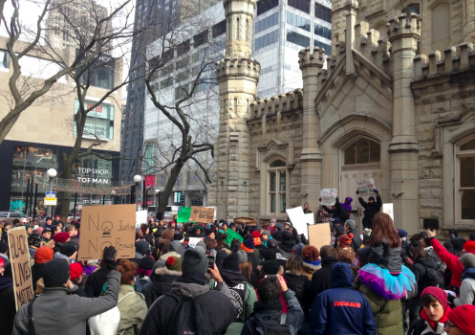Letter to the Editors: Response to Op-Ed on Hoda Katebi
As Supreme Court Justice Louis Brandeis once noted, “Sunlight is said to be the best of disinfectants.” In that spirit, I write to respond to the recent Op-Ed on Hoda Katebi, published by The Forum.
I feel the need to respond to the Op-Ed because I am the person who organized the panel. In my role as Latin’s Difficult Dialogues Coordinator, I invited Ms. Katebi to be a part of our panel, and I stand by that decision. While I sincerely appreciate the editors’ and other students’ encouragement to think more deeply about the implications of that decision, I strongly disagree with this Op-Ed as a means to continue that discussion.
First, to offer some much-needed context, this panel arose, in part, out of conversations with members of our community who responded to my fall message about difficult dialogues and the protests in Iran. Reflecting on those conversations as well as the ongoing coverage of the protests and international responses, it became clear that this was a far more complex issue than many of us had originally assumed. This insightful Op-Ed from the Baltimore Sun by the Maryland Director of the Council on American-Islamic Relations does a great job summarizing many of those concerns. To explore that complexity as well as its implications for broader questions of choice and women’s rights, I and other faculty decided that a panel of experts, who could shine a floodlight instead of a spotlight on these issues, would be the best way to continue exploring the topic.
As I reached out to many different contacts – colleagues, parents, and others – Ms. Katebi was repeatedly mentioned, “as a highly effective, engaged, young Irani voice (who also happens to wear the hijab herself) who speaks with a deep understanding of her country of origin and is unafraid to speak truth to power.” Researching her work, I also found that Ms. Katebi had recently been featured in the New York Times “Visionaries” series, as well as other mainstream media like Vogue, NPR, and Crain’s “20 in their 20s” annual list.
While I was not aware of the tweet highlighted by the editors, I understand the concerns they raise about the sentiment. Clearly, as supporters of Israel, any movement that explicitly threatens the current status of Israel would rightly seem like a reasonable threat. At the same time, I sincerely appreciate the writers’ attempt to separate legitimate criticisms of the state of Israel from more pernicious sentiments of antisemitism.
Beyond that, I strongly agree with some of the editors’ arguments, such as the idea that difficult dialogues cannot work with “those whose speech distorts the truth for the sake of destruction.” That makes me particularly distressed about the clear distortions in this Op-Ed, including the misrepresentation or inaccurate contextualization of its sources as well as the outright inaccuracies about the current condition of Palestinians – all of which are revealed in the sources actually linked within the Op-Ed.
For example, the editors use the phrase, “its UN-granted land” and then link to a history of the 1947 UN Partition borders without any context for how those borders changed in 1949, 1967, and 1982. They also accuse Ms. Katebi of misusing the critique of a “two-sides” argument but then deploy that same logic against her, while, at the same time, misrepresenting another source. Contextualizing the one tweet that serves as the basis for their critique, the editors write, “Israeli soldiers responded to cross-border bombs” and yet the article hyperlinked in that statement is primarily focused on the fact that “38 protesters have been killed by Israeli live fire and more than 1,600 wounded in the weekly protests” that included some protestors throwing “explosives, firebombs and rocks.”
Most glaringly, the writers explicitly deny the experience of Palestinians in Israel, arguing, “Israel currently has roughly 1.6 million Palestinian citizens, who share the same legal rights as any other Israeli citizen.” However, yet again, their own source betrays that fact, as it states, “Though Palestinian citizens of Israel can vote and participate in political life, they face a web of institutionalized discrimination and exclusion.”
I am also concerned about the overall tone and optics of publishing such a piece. Because of her outspoken criticism of the current regime in Iran, Ms. Katebi is under constant threat. As she described during our debriefing lunch, she regularly deals with everything from attempts at assassinating her character to legitimate death threats. Due to the seriousness of these threats, she has received dispensation to not attend in-person classes at the University of California Law School during her final year – an unprecedented accommodation that reflects the risk she also takes in speaking publicly. Despite all of those concerns, she still willingly joined our panel and, in my opinion, did an excellent job bringing to life the nuance and complexity of the situation in Iran. Rewarding that courage with a public takedown will certainly undermine our community’s ability to invite other speakers in the future.
Finally, I am struck by the decision to not mention me or any other administrators by name. While those intentions may have been pure, I wonder if the writers have reflected on the fact that they decided to not name me, as the organizer of the panel, even as they were willing to publicly attack a woman of color, who the writers have never met or spoken to directly.
I support the ideals of open communication and standing against hate that were expressed in the editors’ Op-Ed. I simply hope that we can continue to strive to live up to those ideals. I look forward to partnering with students and others as we continue to tackle that complex work.


















































Evan Jones • Jan 8, 2023 at 7:58 pm
I completely agree with Dr. June in regard to Ms. Katebi’s tweets that were discussed in the op-ed. Since I am not Jewish myself I have not experienced what antisemitism is like and perhaps it is not my place to decern what is antisemitic or not. However, I do believe there is a line between antisemitism and anti-Israel remarks. I think that, in context, Ms. Katebi’s tweets were anti-Israel, and not directed toward the Jewish people specifically.
I applaud Dr. June for his role in the Difficult Dialogues initiative and I think it is incredibly important in Latin’s community. Politicized issues often do not have one definite answer and hearing from multiple sides is crucial in the polarized society we are living in.
I disagree with Dr. June’s response to the FEB’s op-ed where he claims that it is not appropriate or beneficial to discuss their concerns within The Forum. It is ironic that someone advocating for difficult dialogues disapproves of exactly that– a difficult dialogue.
Finally, I am too struck by a decision of calling out. I do not believe that either Ryan or Eden actively made the choice to not include Dr. June or any of the other people involved with the creation of the panel based solely on their race or gender. Similarly, I do not believe that the inclusion of Ms. Katebi’s name, a public figure, had anything to do with her race or gender. It is impossible to write an op-ed on a public figure who spoke to the upper school at a mandatory panel without including her name. It did not involve race or gender.
I want to conclude this comment by applauding Dr. June and everyone involved with the Difficult Dialogues initiative for their work. The panel was an amazing step forward in a direction that I hope Latin continues to move down.
Charlie Gray • Jan 8, 2023 at 11:29 am
EDIT TO PREVIOUS COMMENT: The organization is named Survivors of Latin not Holding Latin Accountable. My apologies.
To be clear, this is not an attack on the brave student activists behind SOL. I consider some of these activists as friends of mine, and I support their important work within our community. I am just pointing out which groups have the megaphone at Latin and which do not.
Charlie Gray 22’ • Jan 8, 2023 at 11:17 am
Curious as to why Latin deems far left criticisms of those who share my identity as “necessary but uncomfortable conversations.” However, when it comes to other issues surrounding different identities, the school is quick to strike those ideas down as “hate speech.”
I remember watching as my peers would blatantly attack those who shared my identity online. These attacks were largely propagated by student activist leaders of organizations like Holding Latin Accountable — the largest student activist body on campus. The biggest rallying cry that I saw within the Latin community — other than the idea that Israel should be wiped from the map entirely — was the idea that the Jews could no longer use the holocaust to justify themselves as a minority. This gross and ignorant narrative completely ignores years of Jewish oppression that still echos in places like New York City. Scarily, this exact same oversimplified narrative is often used against people of color.
Latin does a fantastic job at showcasing the oppression people of color face in modern day by incorporating critical race theory into almost every aspect of Latin education.
Knowing Latins amazing track record of minority education, what did Latin do in 2021 to help people who share my identity? What did Latin do to ease the attacks of misinformation and ignorance against Jewish people in our community? Did the school try to create a dialogue where students could discuss the complex issues of Israel and Palestine? Did the school even attempt to do their job and educate students about violence that Jewish people face in modern day?
No. The school instead shilled out a ton of tuition money to a Jewish member of our community — who’s name I don’t even remember — to give the same copy paste talk about the holocaust. As you can imagine, this talk added more fuel to the antisemitic fire that — after learning about events brought to light by this publication — clearly still burns under the school.
To be clear, I am a left leaning moderate, I am an avid supporter of critical race theory, and I am a strong ally of the LGBTQIA+ and BIPOC communities. I also acknowledge that there is extreme nuance to issues like Israel, and that I am grossly oversimplifying the issue in this short comment.
I am all for having conversations with those whose opinion I disagree with. By the same token, allowing the Latin administration to decide which groups can and cannot be criticized is an incredibly dangerous precedent.
This post is not a specific attack on Dr. June, whom I have a lot of respect for, but rather an observation of the broader Latin community. Dr. June is an incredibly smart and kind teacher who I think is the perfect fit for his role. I am glad to see him standing up for Ms. Katebi’s right to freedom of speech. I hope to see him do the same for others in the future.
As a side note to the editors, in my opinion, Dr. June’s op ed should be featured more prominently. I was unable to find it on the mobile website at all unless linked through instagram directly. Thank you so much to the editors for featuring both viewpoints.
Peter Jones ‘21 • Jan 7, 2023 at 6:58 pm
Kudos to the current FEB for publishing this letter; it’s great to see The Forum continuing to be a platform for community dialogue. The intricacies of this issue aside, I have to speculate that the writers declined to mention Dr. June by name because they (like I) consider him a valued and skilled educator and community member, as distinct from a political figure on the Latin community’s exterior. In an opinion piece whose primary audience is Latin, I don’t see where this constitutes a breach of journalistic ethics/standards — and so I wonder what motivated this letter, well expressed as it is. Proud of everyone, keep comforting the afflicted & afflicting the comfortable.
Amanda Valenzuela • Jan 7, 2023 at 5:08 pm
Dr. June,
Thank you so much for this insightful and respectful response that broadens the discussion. I am grateful to your continued dedication to Difficult Dialogues and your nuanced approach to the controversy surrounding Ms. Katebi as well as the importance of her being a panelist. I really cannot thank you enough for putting so much thought into the panelists and for creating room for these crucial conversations to take place in a community like Latin.